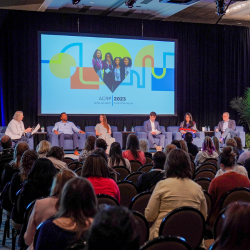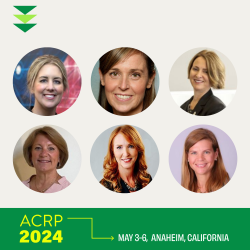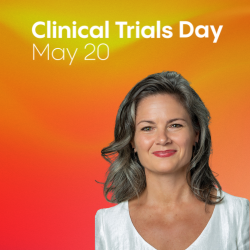When some experience sparks a “rocket launch” of an idea in an entrepreneur’s soul for a disruptive new service or product in the clinical research environment, listening to one’s inner voice is important, but listening to the patients who may benefit if the idea succeeds is most important, a panel of experts told ACRP 2023 attendees Monday morning (May 1) in Dallas, Texas.
Discussing some of the challenges and joys of developing and bringing to market innovative concepts tied to new medical devices, approaches to trial participation opportunities, technology platforms, and advocacy services, the panelists share a commitment to ensuring their projects meet real-world needs at a scale capable of delivering sustainable benefits.
The panel included ACRP Executive Director Susan P. Landis as moderator; Joy Bhosai, MD, MPH, Co-founder and CEO of Pluto Health; John Campbell, Head of Decentralized Clinical Trials for Walgreens; Jen Horonjeff, PhD, Founder and CEO of Savvy Cooperative; Scott Kollins, PhD, Chief Medical Officer for Akili Interactive; and Del Smith, PhD, Co-founder and CEO of Acclinate.
“There’s an enormous possibility for taking lessons learned from [successful] rare disease trials and scaling them to reduce burdens on patients and study sites” of all types through improved trial designs, noted Campbell, who is leading the expansion of Walgreens’ services into the clinical trial realm. “We have the ability, first and foremost, to raise awareness of clinical trials” in the communities the company serves, he said, and to engage them in very different ways than traditional study sites.
Having lived the life of a patient since she was first born, Horonjeff recounted “hearing all my professional colleagues talking about patients, but not talking to them,” thus losing out on opportunities to learn from their shared experiences. “We’re trying to put the power back into patients’ hands,” she added, talking about her focus on helping companies equitably gather input and insights from diverse patients. “If you don’t do the work up front to understand [patients’ needs], then what are we doing here?”
As she describes it, the “spark” for Bhosai’s work (a spin-off from her time with the Duke Clinical Research Institute) on improving patient access and care through a health platform that bridges siloed real-world data came at “the moment when we decided that it’s time to think about the patient experience and how to help them through their journey.” Making sure your passion can align with incentives to keep working on a dream project is key, she added.
Smith’s development of a digital health company engaging and empowering communities of color to make informed health decisions related to clinical trial participation at least partially grew out of seeing his mother die from tuberculosis and only learning later that a clinical trial for the condition was being conducted nearby. “We’ve got to move from being transactional to being relational” about advocating for patients, he said. “It’s risky. It can be scary at times. But I encourage you to make a difference in the world.”
Efforts to bring a new type of mental health digital therapeutic to life by following the pathway to U.S. Food and Drug Administration approval have taught Kollins that there will inevitably be sceptics “who fundamentally don’t understand” what those who are pursuing disruptive innovations are doing. However, he explained, “Listening to yourself is important. [But] more than anything else, [what’s important] is listening to the patients.”
Author: Gary Cramer



